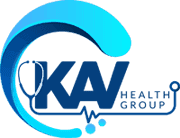Heroin Addiction Counseling & Treatment Program in Ohio
Despite state-funded programs and highly publicized awareness of the issue, heroin abuse has become an increasingly common — and dangerous — threat to the state of Ohio. In Cuyahoga County alone, the state’s largest county and home of Cleveland, heroin deaths rose 1000% between 2007 and 2016. [1]
At KAV Health Group, we’ve dedicated ourselves to providing medication-assisted treatment (MAT) with Suboxone, which allows patients to bypass a traditional detox and begin their recovery journey. We have locations in Cincinnati, Dayton, and Columbus, and offer convenient, easy-to-use telehealth services through which you can receive Suboxone guidance and mental health counseling.
It’s important to understand heroin addiction and the recovery process so that you’re prepared going into treatment and recovery. Read on to learn more about this addiction, and all the ways we can help.

What is Heroin?
Heroin is an opiate, meaning that it’s a “natural” opioid derived from the poppy plant. Like other opioids, heroin binds to the opioid receptors in the user’s nervous system, which triggers a huge release of dopamine and produces a euphoric feeling. It’s an incredibly strong drug that quickly causes users to build up a tolerance and a dependence.
It’s in the same class of drugs as painkillers such as Vicodin® and OxyContin®, but should not be mistaken for a prescribed source of pain relief. Pain pills can still jumpstart an opioid addiction, and when someone’s prescription runs out, they often turn to cheaper and more accessible “street opioids” like heroin.
Heroin comes in a white or brown powder that’s snorted or smoked, or in the “black tar” form that’s injected. It’s sometimes abused with other substances, like “speedballing” (heroin with cocaine). Other times, it may be cut by the seller with other drugs, like the far more potent opioid fentanyl — often without the user’s knowledge. Heroin’s street names include “dope,” “smack,” and “H.”

The Effects of Heroin Addiction Over Time
Heroin does serious, long-lasting damage to the body, and the more someone continues using, the more they’re at risk for:
- Heart disease
- Lung diseases, including pneumonia
- Kidney disease
- Liver disease
- Damaged veins or nose tissue from injections and snorting
- Abscesses around wound sites
- Erectile dysfunction for men
- Disrupted menstruation for women
REQUEST CONSULTATION
Signs & Symptoms of Heroin Abuse
Symptoms of heroin abuse are fairly similar to those of other opioids. Here are some of the most common signs and symptoms to be aware of:
- Flu-like symptoms such as nausea, vomiting, and profuse sweating
- Dramatic changes in behavior or mood
- Mental health issues such as anxiety, depression, and paranoia
- Poor hygiene
- Confused thinking or disorientation
- New social habits including increased isolation or a new circle of friends
- Risky behaviors
- Issues with employment, at school, and with other responsibilities
- Theft and other financial difficulties
- Drug paraphernalia
There are also some physical or visible signs associated with heroin use specifically, including needle track marks, scratches, infected wounds, or runny noses and nosebleeds.
Heroin Addiction
Withdrawal
Heroin withdrawal symptoms are similar to those of withdrawal from other opioids, but some are specific to this harder opioid:
- Strong heroin cravings
- Violent mood swings
- Suicidal thoughts
- Insomnia
- Severe mental health disorders
- Nausea and vomiting
- Intense sweating
- Muscle and bone pain
- Body spasms
- Fluctuating blood pressure and heart rate
Withdrawal tends to last for three to five days, sometimes up to 10. During that time, you have a higher risk for relapse: the cravings can push you to take the same dose of heroin that you’ve been using, but because your body has lost some of its tolerance, this creates a much greater risk of overdose.
Heroin withdrawal symptoms can be so intense that they require medical attention or become life-threatening, which is why it’s best to use a professionally guided program like our personalized Suboxone treatment plans. This can help you manage the symptoms and achieve sobriety without the same pain or risks.
Signs of a Heroin Overdose
Perhaps the most dangerous possibility that comes with heroin abuse is overdose, a risk that only grows over time. Heroin’s tendency to quickly build tolerance and dependency means that a user has to take increasing amounts of heroin to reach the same high — and every upped dose comes with a chance of overdose. And when there’s no real way to evaluate heroin’s purity, or whether it’s been cut with extremely dangerous drugs like fentanyl, that overdose risk gets exponentially higher.
While signs and symptoms of a heroin overdose can range in sensitivity and how noticeable they are, here are some of the most common ones to look out for:
- Respiratory depression or failure; slowed or stopped breathing
- Constricted, pinpoint pupils
- Weak pulse and shallow breathing
- Loss of consciousness
- Blue-colored skin, lips, or nails from poor circulation
- Intense drowsiness and delirium
- Spasms in the abdominal area
- Pale face, clammy skin
Heroin Addiction Treatment Programs in Cincinnati and Dayton, OH
KAV Health Group knows that everyone’s addiction is unique, and that you deserve a uniquely tailored approach to heroin addiction recovery. We use Suboxone, a medication only available by prescription at specialized clinics such as KAV Health Group, which allows you to bypass a more traditional detox and the difficulty that comes with it. Its buprenorphine and naloxone work to satiate your brain’s cravings for opioids and suppress withdrawal symptoms.
We supplement Suboxone with supportive counseling, where you’ll be treated with compassion as we get to the roots of your addiction history. Our one-on-one and group therapy are judgment-free, and you’ll work together with professionals and peers to develop coping mechanisms, trigger-management tools, and other strategies for staying sober out in everyday life.
Perhaps what sets our treatment apart most is how convenient it is to access. We use a secure, HIPAA-compliant telehealth video platform through which you can make appointments six days a week, and even get same-day appointments. You have all the benefits of in-person care, but from the comfort of your home or anywhere with an internet connection.


